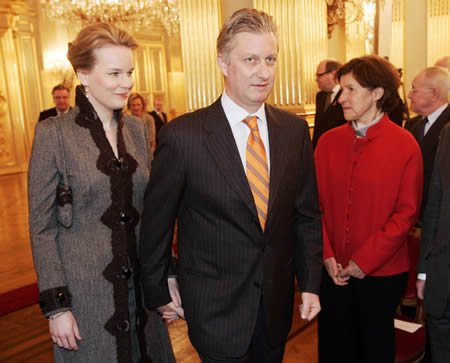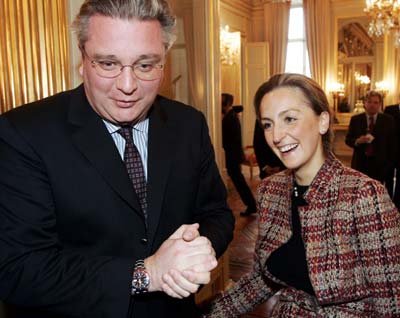You are using an out of date browser. It may not display this or other websites correctly.
You should upgrade or use an alternative browser.
You should upgrade or use an alternative browser.
Royal Family of Belgium: Current Events Part 4
- Thread starter Danielle
- Start date
If you have answers, please help by responding to the unanswered posts.
- Status
- Not open for further replies.
I meant to say thank you for these pictures at the time they were posted, but I completely forgot. Thank you very much for these lovely pictures Cathérine, and thank Chris for me too.
Thank you very much for these lovely pictures Cathérine, and thank Chris for me too. It's great seeing all the pictures after hearing so much about them.
It's great seeing all the pictures after hearing so much about them.
I'll agree with you Alexandria about Mathilde's pants - I'm not too fond of them either.
I'll agree with you Alexandria about Mathilde's pants - I'm not too fond of them either.
fanletizia
Heir Apparent
- Joined
- Jun 19, 2005
- Messages
- 4,265
- City
- Madrid
- Country
- Spain
Getty Images
[URL=http://img499.imageshack.us/my.php?image=1121id.jpg] [URL=http://img494.imageshack.us/my.php?image=1113ox.jpg]
[URL=http://img494.imageshack.us/my.php?image=1113ox.jpg] [URL=http://img494.imageshack.us/my.php?image=1102jc.jpg]
[URL=http://img494.imageshack.us/my.php?image=1102jc.jpg] [URL=http://img494.imageshack.us/my.php?image=1097tp.jpg]
[URL=http://img494.imageshack.us/my.php?image=1097tp.jpg] [URL=http://img494.imageshack.us/my.php?image=1087uc.jpg]
[URL=http://img494.imageshack.us/my.php?image=1087uc.jpg] [URL=http://img100.imageshack.us/my.php?image=1067ma.jpg]
[URL=http://img100.imageshack.us/my.php?image=1067ma.jpg] [URL=http://img100.imageshack.us/my.php?image=1051iu.jpg]
[URL=http://img100.imageshack.us/my.php?image=1051iu.jpg] [URL=http://img62.imageshack.us/my.php?image=1045wg.jpg]
[URL=http://img62.imageshack.us/my.php?image=1045wg.jpg] [URL=http://img62.imageshack.us/my.php?image=1039th.jpg]
[URL=http://img62.imageshack.us/my.php?image=1039th.jpg] [/URL][/URL][/URL][/URL][/URL][/URL][/URL][/URL][/URL]
[/URL][/URL][/URL][/URL][/URL][/URL][/URL][/URL][/URL]
[URL=http://img499.imageshack.us/my.php?image=1121id.jpg]
 [URL=http://img494.imageshack.us/my.php?image=1113ox.jpg]
[URL=http://img494.imageshack.us/my.php?image=1113ox.jpg] [URL=http://img494.imageshack.us/my.php?image=1102jc.jpg]
[URL=http://img494.imageshack.us/my.php?image=1102jc.jpg] [URL=http://img494.imageshack.us/my.php?image=1097tp.jpg]
[URL=http://img494.imageshack.us/my.php?image=1097tp.jpg] [URL=http://img494.imageshack.us/my.php?image=1087uc.jpg]
[URL=http://img494.imageshack.us/my.php?image=1087uc.jpg] [URL=http://img100.imageshack.us/my.php?image=1067ma.jpg]
[URL=http://img100.imageshack.us/my.php?image=1067ma.jpg] [URL=http://img100.imageshack.us/my.php?image=1051iu.jpg]
[URL=http://img100.imageshack.us/my.php?image=1051iu.jpg] [URL=http://img62.imageshack.us/my.php?image=1045wg.jpg]
[URL=http://img62.imageshack.us/my.php?image=1045wg.jpg] [URL=http://img62.imageshack.us/my.php?image=1039th.jpg]
[URL=http://img62.imageshack.us/my.php?image=1039th.jpg] [/URL][/URL][/URL][/URL][/URL][/URL][/URL][/URL][/URL]
[/URL][/URL][/URL][/URL][/URL][/URL][/URL][/URL][/URL]Cathérine Bergeyck
Heir Presumptive
- Joined
- Jan 26, 2003
- Messages
- 2,927
Here's some more from Belga
Attachments
-
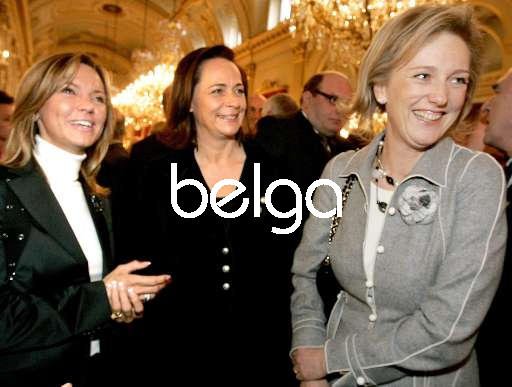 p3841167.jpg35.1 KB · Views: 185
p3841167.jpg35.1 KB · Views: 185 -
 p3841205.jpg43.3 KB · Views: 260
p3841205.jpg43.3 KB · Views: 260 -
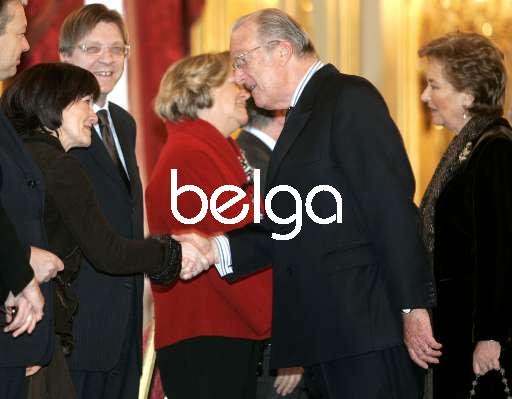 p3841179.jpg30.5 KB · Views: 203
p3841179.jpg30.5 KB · Views: 203 -
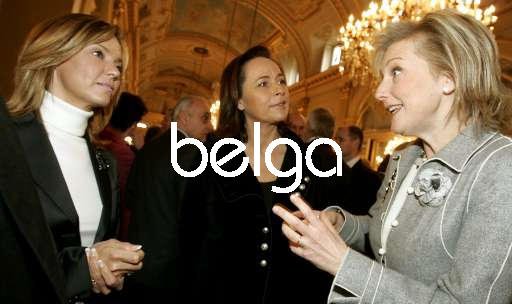 p3841144.jpg29.6 KB · Views: 197
p3841144.jpg29.6 KB · Views: 197 -
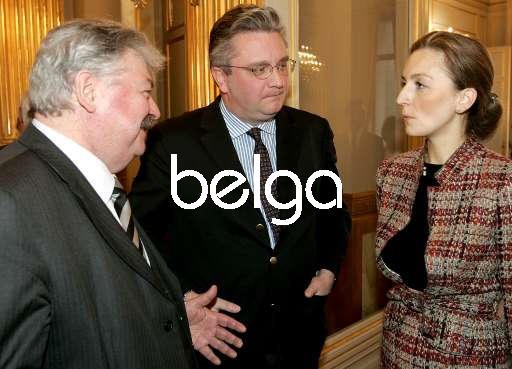 p3841114.jpg37.8 KB · Views: 196
p3841114.jpg37.8 KB · Views: 196 -
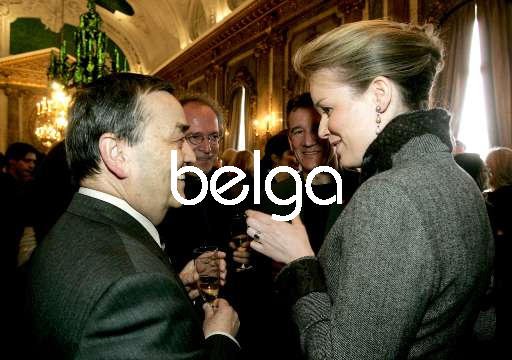 p3841099.jpg39.1 KB · Views: 195
p3841099.jpg39.1 KB · Views: 195 -
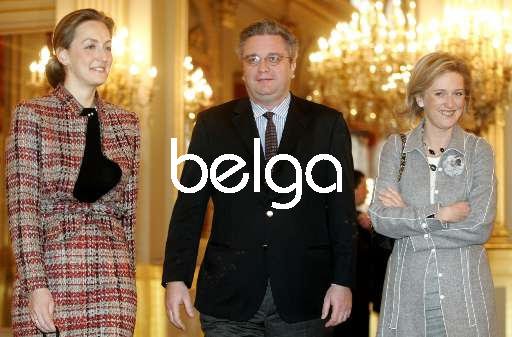 p3841003.jpg39.9 KB · Views: 213
p3841003.jpg39.9 KB · Views: 213 -
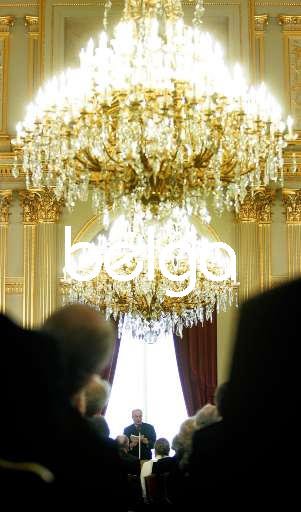 p3840852.jpg31.7 KB · Views: 237
p3840852.jpg31.7 KB · Views: 237 -
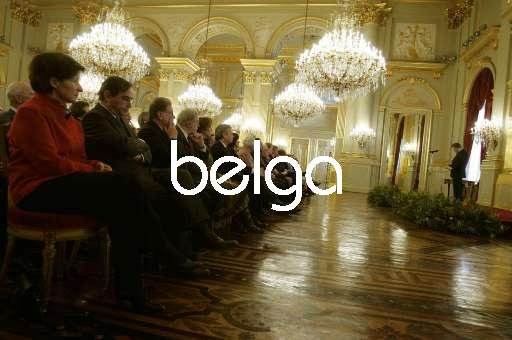 p3840848.jpg33.8 KB · Views: 237
p3840848.jpg33.8 KB · Views: 237
Cathérine Bergeyck
Heir Presumptive
- Joined
- Jan 26, 2003
- Messages
- 2,927
Hannelore
Heir Presumptive
- Joined
- Dec 25, 2003
- Messages
- 2,585
- City
- Bruges
- Country
- Belgium
Cathérine Bergeyck said:gettyimages
Claire looks good, but I think she could have worn something new for this occasion
I agree. It's a boring outfit that she's worn often...
here's more from Isopix (thanks to Jelka's help). Looks like Elio di Rupo (minister president of the Walloon region) went round to see what everybody wanted to drink
Attachments
-
![ISOPIX_00018798-021[1].JPG](/data/attachments/167/167910-9221159ca9bbc1d7399485a7abfb1792.jpg) ISOPIX_00018798-021[1].JPG120.3 KB · Views: 283
ISOPIX_00018798-021[1].JPG120.3 KB · Views: 283 -
![ISOPIX_00018798-025[1].JPG](/data/attachments/167/167912-f4805acadf8f8e67a8b76bcd013715f8.jpg) ISOPIX_00018798-025[1].JPG89.9 KB · Views: 251
ISOPIX_00018798-025[1].JPG89.9 KB · Views: 251 -
![ISOPIX_00018798-024[1].JPG](/data/attachments/167/167911-2daaec42b8042e08112a14a3142d294b.jpg) ISOPIX_00018798-024[1].JPG83.4 KB · Views: 259
ISOPIX_00018798-024[1].JPG83.4 KB · Views: 259 -
![ISOPIX_00018798-020[1].JPG](/data/attachments/167/167909-c20b20749988b7036f14cf3af301aef0.jpg) ISOPIX_00018798-020[1].JPG109.6 KB · Views: 1,440
ISOPIX_00018798-020[1].JPG109.6 KB · Views: 1,440 -
![ISOPIX_00018798-018[1].JPG](/data/attachments/167/167907-f6f80e289e23d457f8a0258b01967e18.jpg) ISOPIX_00018798-018[1].JPG74.2 KB · Views: 309
ISOPIX_00018798-018[1].JPG74.2 KB · Views: 309 -
![ISOPIX_00018798-016[1].JPG](/data/attachments/167/167906-05e94a9ff32e2bc87fc0df5f6f873748.jpg) ISOPIX_00018798-016[1].JPG100 KB · Views: 275
ISOPIX_00018798-016[1].JPG100 KB · Views: 275 -
![ISOPIX_00018798-002[1].JPG](/data/attachments/167/167905-b3fd39f9cb2b99932ae39e9c2c57da79.jpg) ISOPIX_00018798-002[1].JPG120.8 KB · Views: 265
ISOPIX_00018798-002[1].JPG120.8 KB · Views: 265 -
![ISOPIX_00018798-001[1].JPG](/data/attachments/167/167904-d01ff0d0576a7ce916b2d0894279a6d5.jpg) ISOPIX_00018798-001[1].JPG91.9 KB · Views: 245
ISOPIX_00018798-001[1].JPG91.9 KB · Views: 245 -
![ISOPIX_00018798-019[1].JPG](/data/attachments/167/167908-91632eb41e7c477fcbe9e2a215f10f1f.jpg) ISOPIX_00018798-019[1].JPG104.5 KB · Views: 281
ISOPIX_00018798-019[1].JPG104.5 KB · Views: 281
Hannelore
Heir Presumptive
- Joined
- Dec 25, 2003
- Messages
- 2,585
- City
- Bruges
- Country
- Belgium
some more ... Pitty there aren't some more of Mathilde, I'd like to take a closer look at her coat.
Attachments
-
![ISOPIX_00018798-041[1].JPG](/data/attachments/167/167918-a70ff41c1a035c081b073452563d5622.jpg) ISOPIX_00018798-041[1].JPG117.6 KB · Views: 220
ISOPIX_00018798-041[1].JPG117.6 KB · Views: 220 -
![ISOPIX_00018798-048[1].JPG](/data/attachments/167/167922-31e11be48fc762a6dc64c20f12a9eba3.jpg) ISOPIX_00018798-048[1].JPG111.6 KB · Views: 201
ISOPIX_00018798-048[1].JPG111.6 KB · Views: 201 -
![ISOPIX_00018798-047[1].JPG](/data/attachments/167/167921-e19eebf1ee29839cac7044dfa1c80b44.jpg) ISOPIX_00018798-047[1].JPG111.3 KB · Views: 269
ISOPIX_00018798-047[1].JPG111.3 KB · Views: 269 -
![ISOPIX_00018798-046[1].JPG](/data/attachments/167/167920-2f19ba0f02574224eb7194637d9d94f3.jpg) ISOPIX_00018798-046[1].JPG121.3 KB · Views: 264
ISOPIX_00018798-046[1].JPG121.3 KB · Views: 264 -
![ISOPIX_00018798-045[1].JPG](/data/attachments/167/167919-1c926182418cdb9cd9b840eba7e97f6a.jpg) ISOPIX_00018798-045[1].JPG78.3 KB · Views: 233
ISOPIX_00018798-045[1].JPG78.3 KB · Views: 233 -
![ISOPIX_00018798-040[1].JPG](/data/attachments/167/167917-2851f308fc70436cd1bfae0037baf280.jpg) ISOPIX_00018798-040[1].JPG97.7 KB · Views: 435
ISOPIX_00018798-040[1].JPG97.7 KB · Views: 435 -
![ISOPIX_00018798-039[1].JPG](/data/attachments/167/167916-c17edf132b7504f4f406feb898323bf9.jpg) ISOPIX_00018798-039[1].JPG84.8 KB · Views: 283
ISOPIX_00018798-039[1].JPG84.8 KB · Views: 283 -
![ISOPIX_00018798-038[1].JPG](/data/attachments/167/167915-87cd5133e58c946743f2fe5a4e60e5cf.jpg) ISOPIX_00018798-038[1].JPG108 KB · Views: 288
ISOPIX_00018798-038[1].JPG108 KB · Views: 288 -
![ISOPIX_00018798-037[1].JPG](/data/attachments/167/167914-d3ab4fb3b1b5c5c67b9a33eda76a31e9.jpg) ISOPIX_00018798-037[1].JPG112.6 KB · Views: 225
ISOPIX_00018798-037[1].JPG112.6 KB · Views: 225 -
![ISOPIX_00018798-030[1].JPG](/data/attachments/167/167913-d87d85eb4b890954e3f699ab52cebef1.jpg) ISOPIX_00018798-030[1].JPG82 KB · Views: 180
ISOPIX_00018798-030[1].JPG82 KB · Views: 180
Hannelore
Heir Presumptive
- Joined
- Dec 25, 2003
- Messages
- 2,585
- City
- Bruges
- Country
- Belgium
Jelka
Aristocracy
- Joined
- Nov 30, 2003
- Messages
- 185
- City
- Country
- Belgium
I believe it's the same coat Mathilde has worn at Emmanuel's baptism, isn't it?
Cathérine Bergeyck
Heir Presumptive
- Joined
- Jan 26, 2003
- Messages
- 2,927
Cathérine Bergeyck
Heir Presumptive
- Joined
- Jan 26, 2003
- Messages
- 2,927
the king's speech
In French:
Autorités du pays
Monsieur le Premier Ministre,
Au nom des Autorités de notre pays, vous m’avez exprimé, ainsi qu’à ma famille, des vœux très aimables à l’occasion du Nouvel An. Je tiens à vous en remercier bien vivement.
Mesdames, Messieurs,
L’évolution de nos sociétés nous présente de nombreux contrastes. La globalisation économique s’accélère et l’expression « le monde est mon village » devient progressivement une réalité. Beaucoup voyaient dans cette mondialisation un stimulant en faveur de la paix. Mais nous voyons presque journel-lement les terribles ravages occasionnés par de nombreux conflits régionaux. Pensons au Proche-Orient, au Moyen-Orient, à l’Afrique centrale. Par ailleurs, dans des ensembles stables, comme l’Union européenne, des réflexes nationalistes reprennent force, et dans les états nationaux les tensions entre groupes sociaux ou entre régions s’accentuent.
Dans ce dernier domaine j’aimerais aborder deux questions et examiner avec vous comment y faire face. La première a trait aux tensions existant entre certains groupes allochtones et la population d’origine autochtone.
Nous avons tous vu les images montrant les violences perpétrées dans un pays proche, par des groupes de jeunes. Les tensions qui ont explosé là-bas, existent à l’état plus ou moins latent dans d’autres pays européens. Elles sont d’ailleurs exploitées par des partis extrémistes.
Que devons nous faire vis-à-vis de telles situations ? L’Observatoire européen des phénomènes racistes et xénophobes fait, me semble-t-il, un certain nombre de réflexions très adéquates. Il attribue une bonne partie de ces tensions au fait qu’un grand nombre de jeunes allochtones ne voient plus aucune perspective d’avenir dans nos sociétés.
Quelles sont dès lors les politiques que nous devons mener dans nos pays européens ?
Il me semble qu’une première priorité consiste à intensifier la formation des jeunes d’origine étrangère, spécialement dans nos grandes villes, et de stimuler l’obtention d’un emploi pour ces jeunes. L’enseignement et l’emploi sont souvent les clefs d’une bonne intégration. Un autre facteur non négligeable réside dans l’encouragement de la construction ou de la rénovation de logements favorisant réellement une vie décente et en contact avec le monde environnant. Par ailleurs, nous devons par l’enseignement convaincre les jeunes du respect nécessaire des valeurs de base de notre société sans quoi la vie commune risque le désordre et l’injustice. Parmi ces valeurs je pense spécialement à la démocratie, à la tolérance, au respect de la femme, et à la sécurité de chacun.
Assurer la sécurité des citoyens est une obligation fondamentale de tout Etat. Si, malgré les efforts, les tensions deviennent aiguës, c’est encore à la prévention qu’il faut recourir en premier lieu.
A ce propos, je voudrais rendre hommage aux travailleurs sociaux de rue qui font chez nous un travail remarquable de proximité et d’écoute des jeunes en difficulté. Je me réjouis de la promesse qui leur a été faite, dans le cadre des contrats de sécurité des villes, de rendre leur statut plus stable.
Les efforts pour favoriser l’intégration et éviter la discorde peuvent se révéler impuissants à éviter le conflit. Alors il appartient aux forces de police de rétablir et de maintenir l’ordre, et à la justice de juger les fautes commises.
Quant à ceux qui, d’un bord ou d’un autre, s’emploient à exploiter ces difficultés pour répandre le racisme ou l’intégrisme, ils doivent savoir qu’eux aussi s’exposent à des poursuites judiciaires. On ne bâtit pas une société sur la haine et le mépris de l’autre.
La seconde question que je voudrais développer avec vous est celle des tensions entre régions. Elles se présentent dans de nombreux pays européens et nous non plus n’y échappons pas … comme vous le savez. Elles sont dans bien des cas accentuées par la diffusion de deux constatations. D’une part l’existence d’un écart de richesse et d’autre part la pratique de politiques différentes. Ces situations inégales, entraînant des transferts entre régions, sont communes à beaucoup de pays en Europe. La réponse à cet état de choses ne réside pas dans un repli sur soi de chaque région ; non plus dans le développement de sous-nationalismes, ni dans un séparatisme explicite ou feutré. Les ruptures, les séparations, sont en général coûteuses pour tous les acteurs, qu’ils soient du côté des moins prospères ou des plus riches. Et n’oublions surtout pas les coûts humains qu’on aurait grand tort de sous-estimer. Il ne faut pas se bercer d’illusions à ce sujet.
La réponse aux différences de prospérité et de politiques réside, tant au niveau européen que national ou régional dans l’élaboration de stratégies de développement qui soient béné-fiques pour chacune de ces entités.
Il est vrai qu’à tous ces niveaux, il y a des choses à faire. Des conservatismes, des résistances au changement sont à vaincre, des abus à éliminer.
Des efforts ont déjà été entrepris dans l’Union européenne et dans notre pays. La stratégie de Lisbonne doit être accélérée et intensifiée, notamment en matière d’enseignement, de recherche et d’innovation. Il importe également de privilégier l’emploi par rapport à l’accroissement des rémunérations et d’apporter des solutions aux conséquences du vieillissement de la population. Il y a aussi des dérives à combattre comme les fraudes fiscales et sociales ou les abus de biens sociaux.
Au sein de notre pays des efforts importants ont été faits dans chaque région et au niveau fédéral. Je pense notamment à l’accroissement sensible des budgets de recherche en Flandre, au lancement du plan Marshall en Wallonie ou au développement international de Bruxelles, et sur le plan fédéral aux efforts pour relever le taux d’activité de la population, notamment par le pacte de solidarité entre les générations.
Certes il y a encore beaucoup de pain sur la planche, mais de grâce, ne tirons pas de conclusions hâtives basées sur l’observation de certaines différences économiques. Regardons les défis avec courage, et valorisons au maximum les atouts que nous possédons. Je pense, par exemple, au rôle international de Bruxelles et de tout notre pays qui pourrait être compromis par un séparatisme néfaste et anachronique.
C’est en décidant tous ensemble de relever ces défis, et confiants que nous y parviendrons, que la Reine et moi et toute notre famille, vous souhaitons à toutes et à tous une très heureuse année.
In French:
Autorités du pays
Monsieur le Premier Ministre,
Au nom des Autorités de notre pays, vous m’avez exprimé, ainsi qu’à ma famille, des vœux très aimables à l’occasion du Nouvel An. Je tiens à vous en remercier bien vivement.
Mesdames, Messieurs,
L’évolution de nos sociétés nous présente de nombreux contrastes. La globalisation économique s’accélère et l’expression « le monde est mon village » devient progressivement une réalité. Beaucoup voyaient dans cette mondialisation un stimulant en faveur de la paix. Mais nous voyons presque journel-lement les terribles ravages occasionnés par de nombreux conflits régionaux. Pensons au Proche-Orient, au Moyen-Orient, à l’Afrique centrale. Par ailleurs, dans des ensembles stables, comme l’Union européenne, des réflexes nationalistes reprennent force, et dans les états nationaux les tensions entre groupes sociaux ou entre régions s’accentuent.
Dans ce dernier domaine j’aimerais aborder deux questions et examiner avec vous comment y faire face. La première a trait aux tensions existant entre certains groupes allochtones et la population d’origine autochtone.
Nous avons tous vu les images montrant les violences perpétrées dans un pays proche, par des groupes de jeunes. Les tensions qui ont explosé là-bas, existent à l’état plus ou moins latent dans d’autres pays européens. Elles sont d’ailleurs exploitées par des partis extrémistes.
Que devons nous faire vis-à-vis de telles situations ? L’Observatoire européen des phénomènes racistes et xénophobes fait, me semble-t-il, un certain nombre de réflexions très adéquates. Il attribue une bonne partie de ces tensions au fait qu’un grand nombre de jeunes allochtones ne voient plus aucune perspective d’avenir dans nos sociétés.
Quelles sont dès lors les politiques que nous devons mener dans nos pays européens ?
Il me semble qu’une première priorité consiste à intensifier la formation des jeunes d’origine étrangère, spécialement dans nos grandes villes, et de stimuler l’obtention d’un emploi pour ces jeunes. L’enseignement et l’emploi sont souvent les clefs d’une bonne intégration. Un autre facteur non négligeable réside dans l’encouragement de la construction ou de la rénovation de logements favorisant réellement une vie décente et en contact avec le monde environnant. Par ailleurs, nous devons par l’enseignement convaincre les jeunes du respect nécessaire des valeurs de base de notre société sans quoi la vie commune risque le désordre et l’injustice. Parmi ces valeurs je pense spécialement à la démocratie, à la tolérance, au respect de la femme, et à la sécurité de chacun.
Assurer la sécurité des citoyens est une obligation fondamentale de tout Etat. Si, malgré les efforts, les tensions deviennent aiguës, c’est encore à la prévention qu’il faut recourir en premier lieu.
A ce propos, je voudrais rendre hommage aux travailleurs sociaux de rue qui font chez nous un travail remarquable de proximité et d’écoute des jeunes en difficulté. Je me réjouis de la promesse qui leur a été faite, dans le cadre des contrats de sécurité des villes, de rendre leur statut plus stable.
Les efforts pour favoriser l’intégration et éviter la discorde peuvent se révéler impuissants à éviter le conflit. Alors il appartient aux forces de police de rétablir et de maintenir l’ordre, et à la justice de juger les fautes commises.
Quant à ceux qui, d’un bord ou d’un autre, s’emploient à exploiter ces difficultés pour répandre le racisme ou l’intégrisme, ils doivent savoir qu’eux aussi s’exposent à des poursuites judiciaires. On ne bâtit pas une société sur la haine et le mépris de l’autre.
La seconde question que je voudrais développer avec vous est celle des tensions entre régions. Elles se présentent dans de nombreux pays européens et nous non plus n’y échappons pas … comme vous le savez. Elles sont dans bien des cas accentuées par la diffusion de deux constatations. D’une part l’existence d’un écart de richesse et d’autre part la pratique de politiques différentes. Ces situations inégales, entraînant des transferts entre régions, sont communes à beaucoup de pays en Europe. La réponse à cet état de choses ne réside pas dans un repli sur soi de chaque région ; non plus dans le développement de sous-nationalismes, ni dans un séparatisme explicite ou feutré. Les ruptures, les séparations, sont en général coûteuses pour tous les acteurs, qu’ils soient du côté des moins prospères ou des plus riches. Et n’oublions surtout pas les coûts humains qu’on aurait grand tort de sous-estimer. Il ne faut pas se bercer d’illusions à ce sujet.
La réponse aux différences de prospérité et de politiques réside, tant au niveau européen que national ou régional dans l’élaboration de stratégies de développement qui soient béné-fiques pour chacune de ces entités.
Il est vrai qu’à tous ces niveaux, il y a des choses à faire. Des conservatismes, des résistances au changement sont à vaincre, des abus à éliminer.
Des efforts ont déjà été entrepris dans l’Union européenne et dans notre pays. La stratégie de Lisbonne doit être accélérée et intensifiée, notamment en matière d’enseignement, de recherche et d’innovation. Il importe également de privilégier l’emploi par rapport à l’accroissement des rémunérations et d’apporter des solutions aux conséquences du vieillissement de la population. Il y a aussi des dérives à combattre comme les fraudes fiscales et sociales ou les abus de biens sociaux.
Au sein de notre pays des efforts importants ont été faits dans chaque région et au niveau fédéral. Je pense notamment à l’accroissement sensible des budgets de recherche en Flandre, au lancement du plan Marshall en Wallonie ou au développement international de Bruxelles, et sur le plan fédéral aux efforts pour relever le taux d’activité de la population, notamment par le pacte de solidarité entre les générations.
Certes il y a encore beaucoup de pain sur la planche, mais de grâce, ne tirons pas de conclusions hâtives basées sur l’observation de certaines différences économiques. Regardons les défis avec courage, et valorisons au maximum les atouts que nous possédons. Je pense, par exemple, au rôle international de Bruxelles et de tout notre pays qui pourrait être compromis par un séparatisme néfaste et anachronique.
C’est en décidant tous ensemble de relever ces défis, et confiants que nous y parviendrons, que la Reine et moi et toute notre famille, vous souhaitons à toutes et à tous une très heureuse année.
Cathérine Bergeyck
Heir Presumptive
- Joined
- Jan 26, 2003
- Messages
- 2,927
In Dutch:
Mijnheer de Eerste Minister,
U heeft mij en mijn familie, in naam van de Overheden van ons land, goede wensen geboden ter gelegenheid van het nieuwe jaar. Ik dank er U zeer hartelijk voor.
Dames en Heren,
De evolutie van onze samenleving vertoont heel wat contrasten. De economie globaliseert snel en de uitdrukking “de wereld is mijn dorp” wordt stilaan realiteit. Velen hebben gemeend dat die mondialisering een stimulans zou betekenen voor de vrede. Maar bijna dagelijks krijgen we de ontstellende vernielingen te zien die talrijke regionale conflicten aanrichten. Denken we maar aan het
Nabije-Oosten, aan het Midden-Oosten, aan Centraal-Afrika. Bovendien kan men ook vaststellen dat binnen stabiele gehelen, zoals de Europese Unie, nationalistische reflexen aan kracht winnen en dat in de nationale staten de spanningen tussen sociale groepen of tussen gewesten, toenemen.
Op dat gebied zou ik twee kwesties willen aansnijden en samen met U nagaan hoe die toestanden te beheersen. De eerste heeft betrekking op de spanningen tussen sommige allochtone groepen en de autochtone bevolking.
We hebben allen de beelden kunnen zien van de geweldplegingen die, in een buurland, door groepen jongeren werden begaan. De spanningen die daar explodeerden, zijn ook min of meer latent aanwezig in andere Europese landen. Bepaalde extremistische partijen slaan daar trouwens munt uit.
Wat moeten we in zulke situaties doen ? Ik meen dat het Europees Waarnemingscentrum voor Racisme en Vreemdelingenhaat hierover enkele zakelijke beschouwingen heeft geformuleerd. Het Centrum schrijft een groot deel van die spanningen toe aan het feit dat veel allochtone jongeren geen enkel toekomstperspectief meer zien in onze samenleving.
Welk beleid moeten de Europese landen dan voeren?
Ik meen dat een eerste prioriteit het opvoeren moet zijn van de vorming van jongeren van vreemde afkomst, voornamelijk in onze grote steden, en dat wij hun tewerkstelling moeten stimuleren. Onderwijs en een baan zijn meestal de sleutels voor een geslaagde integratie. Een factor van betekenis bestaat er ook in, de bouw of de renovatie aan te moedigen van woongelegenheid die daadwerkelijk een fatsoenlijk leven en makkelijke contacten met de ruime buitenwereld bevordert. Bovendien moeten we dank zij het onderwijs ertoe komen jongeren te overtuigen dat eerbied voor de basiswaarden van onze samenleving onontbeerlijk is als wij niet het risico willen lopen in een wanordelijke en onbillijke samenleving te belanden. Ik denk meer bepaald aan de waarden van verdraagzaamheid, van democratie, van respect voor de vrouw, en van veiligheid voor elkeen.
De veiligheid van de burgers vrijwaren is een fundamentele verplichting voor elke Staat. Als, niettegenstaande grote inzet, spanningen acuut worden, ook dan nog moet men in de eerste plaats een beroep doen op preventie.
Op dat vlak wil ik graag hulde brengen aan de straathoekwerkers die bij ons een opmerkelijke taak van nabijheid en van luisterbereidheid volbrengen bij jongeren in moeilijkheden. Het verheugt me dat hen een stabieler statuut werd beloofd, in het kader van de veiligheidscontracten van de steden.
Inspanningen om integratie te bevorderen en onenigheid te vermijden, zijn niet altijd bij machte een conflict te voorkomen. Dan is het de taak van de politiediensten om de orde te herstellen en te handhaven, en is het aan justitie om de begane fouten te beoordelen.
Zij die, van welke kant dan ook, die moeilijkheden trachten te benutten om racisme of integrisme te verspreiden, moeten wel beseffen dat ook zij blootstaan aan rechtsvervolging.
Men bouwt geen samenleving op misprijzen en haatgevoelens tegenover de andere.
De tweede kwestie die ik met U wou bespreken, betreft de spanningen tussen gewesten. Ze bestaan in talrijke Europese landen en ook wij ontsnappen er niet aan… zoals U wel weet. In vele gevallen worden ze nog geaccentueerd door de verspreiding van twee vaststellingen. Enerzijds het bestaan van een verschil in welstand en anderzijds een verschil in beleid. Die ongelijke toestand, die met zich
geldoverdrachten tussen gewesten meebrengt, doet zich voor in vele Europese landen. In die omstandigheden bestaat het antwoord niet in een in zichzelf keren van elk gewest, ook niet in het ontwikkelen van een subnationalisme, en evenmin in openlijk of omfloerst separatisme. Breuken en scheidingen vallen meestal duur uit voor alle betrokkenen of ze nu rijk of weinig welvarend zijn. Ook de menselijke kostprijs mag zeker niet vergeten worden; hem geringschatten zou een grove fout zijn. Op al die vlakken mag men geen illusies koesteren.
Een antwoord bieden op die verschillen in welvaart en beleid bestaat erin dat men op alle niveaus, zowel het Europese, het nationale of het gewestelijke, een ontwikkelingsstrategie uitwerkt die vruchten afwerpt voor ieder van die entiteiten.
Op alle niveaus is er weliswaar nog veel te doen. Conservatisme en veranderingsvrees dienen overwonnen te worden, en misbruiken weggewerkt.
In de Europese Unie en in ons land werden er al heel wat stappen gezet. De strategie van Lissabon moet versneld en intenser worden toegepast, met name in het onderwijs, het onderzoek en de innovatie. Het is ook belangrijk tewerkstelling voorrang te geven op loongroei, en een oplossing aan te dragen voor de gevolgen van de vergrijzing. Scheefgroei zoals fiscale en sociale fraude, of misbruik van gemeenschapsvoorzieningen dient bestreden te worden.
In ons land werden er reeds vrij grote inspanningen geleverd in elk gewest en ook op federaal niveau. Ik denk in het bijzonder aan de belangrijke verhoging van de begroting voor wetenschappelijk onderzoek in Vlaanderen, aan het uitbrengen van het Marshallplan in Wallonië, aan de internationale ontwikkeling van Brussel, en aan de inzet op federaal vlak om, onder meer door het generatiepact, de activiteitsgraad van de bevolking te doen toenemen.
Er valt zeker nog veel te doen, maar in vredesnaam, laat ons geen overhaaste besluiten trekken uitgaande van bepaalde economische verschillen. Laat ons de uitdagingen moedig tegemoet gaan, en onze troeven maximaal valoriseren. Ik denk bijvoorbeeld aan de internationale rol van Brussel en van gans ons land die in gevaar zouden komen door een anachronistisch en rampzalig separatisme.
Met de wil allen tezamen die uitdagingen aan te gaan en erop vertrouwend dat we daarin zullen slagen, wensen de Koningin en ikzelf, en gans onze familie, U allen een heel voorspoedig jaar.

Mijnheer de Eerste Minister,
U heeft mij en mijn familie, in naam van de Overheden van ons land, goede wensen geboden ter gelegenheid van het nieuwe jaar. Ik dank er U zeer hartelijk voor.
Dames en Heren,
De evolutie van onze samenleving vertoont heel wat contrasten. De economie globaliseert snel en de uitdrukking “de wereld is mijn dorp” wordt stilaan realiteit. Velen hebben gemeend dat die mondialisering een stimulans zou betekenen voor de vrede. Maar bijna dagelijks krijgen we de ontstellende vernielingen te zien die talrijke regionale conflicten aanrichten. Denken we maar aan het
Nabije-Oosten, aan het Midden-Oosten, aan Centraal-Afrika. Bovendien kan men ook vaststellen dat binnen stabiele gehelen, zoals de Europese Unie, nationalistische reflexen aan kracht winnen en dat in de nationale staten de spanningen tussen sociale groepen of tussen gewesten, toenemen.
Op dat gebied zou ik twee kwesties willen aansnijden en samen met U nagaan hoe die toestanden te beheersen. De eerste heeft betrekking op de spanningen tussen sommige allochtone groepen en de autochtone bevolking.
We hebben allen de beelden kunnen zien van de geweldplegingen die, in een buurland, door groepen jongeren werden begaan. De spanningen die daar explodeerden, zijn ook min of meer latent aanwezig in andere Europese landen. Bepaalde extremistische partijen slaan daar trouwens munt uit.
Wat moeten we in zulke situaties doen ? Ik meen dat het Europees Waarnemingscentrum voor Racisme en Vreemdelingenhaat hierover enkele zakelijke beschouwingen heeft geformuleerd. Het Centrum schrijft een groot deel van die spanningen toe aan het feit dat veel allochtone jongeren geen enkel toekomstperspectief meer zien in onze samenleving.
Welk beleid moeten de Europese landen dan voeren?
Ik meen dat een eerste prioriteit het opvoeren moet zijn van de vorming van jongeren van vreemde afkomst, voornamelijk in onze grote steden, en dat wij hun tewerkstelling moeten stimuleren. Onderwijs en een baan zijn meestal de sleutels voor een geslaagde integratie. Een factor van betekenis bestaat er ook in, de bouw of de renovatie aan te moedigen van woongelegenheid die daadwerkelijk een fatsoenlijk leven en makkelijke contacten met de ruime buitenwereld bevordert. Bovendien moeten we dank zij het onderwijs ertoe komen jongeren te overtuigen dat eerbied voor de basiswaarden van onze samenleving onontbeerlijk is als wij niet het risico willen lopen in een wanordelijke en onbillijke samenleving te belanden. Ik denk meer bepaald aan de waarden van verdraagzaamheid, van democratie, van respect voor de vrouw, en van veiligheid voor elkeen.
De veiligheid van de burgers vrijwaren is een fundamentele verplichting voor elke Staat. Als, niettegenstaande grote inzet, spanningen acuut worden, ook dan nog moet men in de eerste plaats een beroep doen op preventie.
Op dat vlak wil ik graag hulde brengen aan de straathoekwerkers die bij ons een opmerkelijke taak van nabijheid en van luisterbereidheid volbrengen bij jongeren in moeilijkheden. Het verheugt me dat hen een stabieler statuut werd beloofd, in het kader van de veiligheidscontracten van de steden.
Inspanningen om integratie te bevorderen en onenigheid te vermijden, zijn niet altijd bij machte een conflict te voorkomen. Dan is het de taak van de politiediensten om de orde te herstellen en te handhaven, en is het aan justitie om de begane fouten te beoordelen.
Zij die, van welke kant dan ook, die moeilijkheden trachten te benutten om racisme of integrisme te verspreiden, moeten wel beseffen dat ook zij blootstaan aan rechtsvervolging.
Men bouwt geen samenleving op misprijzen en haatgevoelens tegenover de andere.
De tweede kwestie die ik met U wou bespreken, betreft de spanningen tussen gewesten. Ze bestaan in talrijke Europese landen en ook wij ontsnappen er niet aan… zoals U wel weet. In vele gevallen worden ze nog geaccentueerd door de verspreiding van twee vaststellingen. Enerzijds het bestaan van een verschil in welstand en anderzijds een verschil in beleid. Die ongelijke toestand, die met zich
geldoverdrachten tussen gewesten meebrengt, doet zich voor in vele Europese landen. In die omstandigheden bestaat het antwoord niet in een in zichzelf keren van elk gewest, ook niet in het ontwikkelen van een subnationalisme, en evenmin in openlijk of omfloerst separatisme. Breuken en scheidingen vallen meestal duur uit voor alle betrokkenen of ze nu rijk of weinig welvarend zijn. Ook de menselijke kostprijs mag zeker niet vergeten worden; hem geringschatten zou een grove fout zijn. Op al die vlakken mag men geen illusies koesteren.
Een antwoord bieden op die verschillen in welvaart en beleid bestaat erin dat men op alle niveaus, zowel het Europese, het nationale of het gewestelijke, een ontwikkelingsstrategie uitwerkt die vruchten afwerpt voor ieder van die entiteiten.
Op alle niveaus is er weliswaar nog veel te doen. Conservatisme en veranderingsvrees dienen overwonnen te worden, en misbruiken weggewerkt.
In de Europese Unie en in ons land werden er al heel wat stappen gezet. De strategie van Lissabon moet versneld en intenser worden toegepast, met name in het onderwijs, het onderzoek en de innovatie. Het is ook belangrijk tewerkstelling voorrang te geven op loongroei, en een oplossing aan te dragen voor de gevolgen van de vergrijzing. Scheefgroei zoals fiscale en sociale fraude, of misbruik van gemeenschapsvoorzieningen dient bestreden te worden.
In ons land werden er reeds vrij grote inspanningen geleverd in elk gewest en ook op federaal niveau. Ik denk in het bijzonder aan de belangrijke verhoging van de begroting voor wetenschappelijk onderzoek in Vlaanderen, aan het uitbrengen van het Marshallplan in Wallonië, aan de internationale ontwikkeling van Brussel, en aan de inzet op federaal vlak om, onder meer door het generatiepact, de activiteitsgraad van de bevolking te doen toenemen.
Er valt zeker nog veel te doen, maar in vredesnaam, laat ons geen overhaaste besluiten trekken uitgaande van bepaalde economische verschillen. Laat ons de uitdagingen moedig tegemoet gaan, en onze troeven maximaal valoriseren. Ik denk bijvoorbeeld aan de internationale rol van Brussel en van gans ons land die in gevaar zouden komen door een anachronistisch en rampzalig separatisme.
Met de wil allen tezamen die uitdagingen aan te gaan en erop vertrouwend dat we daarin zullen slagen, wensen de Koningin en ikzelf, en gans onze familie, U allen een heel voorspoedig jaar.

selminha
Courtier
- Joined
- Jun 19, 2005
- Messages
- 607
- Country
- Portugal
Thanks for the beautiful photos. The coat of Mathilde is lovely!
Hannelore said:Pitty there aren't some more of Mathilde.
Yes, it seems strange somehow that there aren't more pictures of her. But she's been at all the other new year's receptions, so maybe the photographers thought it was time for someone else to shine.
Alexandria
Heir Apparent
- Joined
- Jan 14, 2003
- Messages
- 3,207
- Country
- Canada
Does Prince Lorentz have a private sector job or does she solely do royal duties?
I've noticed that Princess Astrid very often attends royal duties with the rest of her family alone and without her husband's accompanient.
I've noticed that Princess Astrid very often attends royal duties with the rest of her family alone and without her husband's accompanient.
sara1981
Heir Apparent
- Joined
- Apr 19, 2003
- Messages
- 3,426
- City
- North Little Rock
- Country
- United States
King Albert and Queen Paola of Belgium news and pictures part 1
King warns against separatism, extremism
http://www.expatica.com/source/site_article.asp?subchannel_id=24&story_id=27250&name=King+warns+against+separatism%2C+extremism
King warns against separatism, extremism
http://www.expatica.com/source/site_article.asp?subchannel_id=24&story_id=27250&name=King+warns+against+separatism%2C+extremism
purple_platinum
Heir Apparent
- Joined
- Mar 14, 2003
- Messages
- 4,848
- City
- Jakarta
- Country
- Indonesia
crisiñaki
Heir Apparent
- Joined
- Dec 1, 2005
- Messages
- 3,788
- City
- London
- Country
- United Kingdom
Mette2 said:Yes, it seems strange somehow that there aren't more pictures of her. But she's been at all the other new year's receptions, so maybe the photographers thought it was time for someone else to shine.Thank you to everyone who posted these wonderful pictures.
It's great to see Claire again, and she looks wonderful. It's also great to see so many members of the royal family present for this event.
I believe the spotlight was reserved for Claire, I think this is the first official act she attended after the twins's birth
Jelka
Aristocracy
- Joined
- Nov 30, 2003
- Messages
- 185
- City
- Country
- Belgium
Alexandria said:Does Prince Lorentz have a private sector job or does she solely do royal duties?
I've noticed that Princess Astrid very often attends royal duties with the rest of her family alone and without her husband's accompanient.
Yes, Prince Lorenz has a job in the private sector, more specificly in the financial sector. I believe he has a very important function in a bank. I think it was for his job that Princess Astrid and her family lived in Switzerland during the first years of their marriage, but when the succession law changed in Belgium, they moved back to Belgium, because suddenly Astrid became second in line for the throne.
purple_platinum
Heir Apparent
- Joined
- Mar 14, 2003
- Messages
- 4,848
- City
- Jakarta
- Country
- Indonesia
I wonder during these New Year Reception, we often see the King sit down and have 1-on-1 conversation with prominent figure, whether from nato, military, government minister, or ambassadors (depending on the guests). Does he had 1-on-1 conversation with all the guests?
What are the events on these new year reception? shakes hand, then sitting down and listening to speeches, then eat? can someone please explain it...
What are the events on these new year reception? shakes hand, then sitting down and listening to speeches, then eat? can someone please explain it...
purple_platinum
Heir Apparent
- Joined
- Mar 14, 2003
- Messages
- 4,848
- City
- Jakarta
- Country
- Indonesia
BELGIUM's ROYAL MUMS TAKE A WELL-DESERVED BREAK
Belgium's Princess Claire has her hands full these days as she and her husband Prince Laurent put all their energies into looking after their new twins. The proud parents, who welcomed little princes Aymeric and Nicolas on December 13, got the chance to take a day off from their familial duties and catch up with old friends when they attended a reception at the Royal Palace on Tuesday.
And they weren't the only mum and dad enjoying some grown-up company, as Prince Philippe and his wife Mathilde were likewise in attendance for the glitzy bash. The crown princess, who was her usual elegant self in a tailored charcoal grey coat dress, seemed to be enjoying herself immensely, laughing heartily as she shared a joke with some of the guests.
http://www.hellomagazine.com/royalty/2006/02/01/belgianroyals/
Belgium's Princess Claire has her hands full these days as she and her husband Prince Laurent put all their energies into looking after their new twins. The proud parents, who welcomed little princes Aymeric and Nicolas on December 13, got the chance to take a day off from their familial duties and catch up with old friends when they attended a reception at the Royal Palace on Tuesday.
And they weren't the only mum and dad enjoying some grown-up company, as Prince Philippe and his wife Mathilde were likewise in attendance for the glitzy bash. The crown princess, who was her usual elegant self in a tailored charcoal grey coat dress, seemed to be enjoying herself immensely, laughing heartily as she shared a joke with some of the guests.
http://www.hellomagazine.com/royalty/2006/02/01/belgianroyals/
Attachments
I just read on the GREMB that there is some controversy over the King's speech yesterday. I would be interested to hear what those of you living in Belgium thought of the speech -- or is that opening a Pandora's box? I am interested to know if you think Philippe will be a king along the lines of King Baudoin as opposed to his father? Do you have any way to tell that yet?
Well Emily , It's true that the flemish ( we speak dutch) people give a lot of money on Wallonie ( they speak french) .We , people in Flanders have the impression that the king is on the side of Wallonie , he thinks it's normal that we give the money , and I know a lot of people think it's not normal . Ofcourse , we're one country , we have to help eachother . But the past year there were also political problems about dividing Brussel-Halle-Vilvoorde .Wallonie didn't agree with it . It's not my opinion , but I know a lot of people think that Wallonie isn't doing anything about the unemployment, because we have enough money the help them .
It always has been a dificult issue , So I think it was wrong that the King mentioned it in his speech.
But it's hard to understand for people who don't know the history between Wallonie- Flanders . The're has always been a ( little) fight between them .
And now this fight comes up again , but i'm sure it will rest again
It always has been a dificult issue , So I think it was wrong that the King mentioned it in his speech.
But it's hard to understand for people who don't know the history between Wallonie- Flanders . The're has always been a ( little) fight between them .
And now this fight comes up again , but i'm sure it will rest again
Last edited:
Cathérine Bergeyck
Heir Presumptive
- Joined
- Jan 26, 2003
- Messages
- 2,927
It IS normal that you have to be solidary with one another. 100 years ago Flanders was a poor region and Wallonia was wealthy and now the roles are reversed (not that Wallonia is really poor, Flanders is just extremely wealthy).
The king does absolutely not choose a side. He just says it's important to stick together and help each other, even though you live in a different region and speak a different language.
It's above all a political issue, not one that people are concerned with in their daily life IMO.
Certain political parties, like the fascist Vlaams Belang and seperatist NVA now exploit these issues to break Belgium up. That is what king Albert reacted against. He said it was simply not a solution, it will only cost money to everbody. And what would you do with Brussels? Brussels geographically lies in Flanders but 80% of the people living there are francophone. It's officially bilingual but in reality more French than Dutch speaking (although this has improved the last years IMO). On top of that, it's also the capital of Europe. Not some city you toss around between different groups of people.
The whole separatist movement (mind you a small minority in Belgium) is inspired by selfishness, greed and to some extent also racism.
Of course politicians don't like people mingling in their affairs and that's why they react so strongly, but it'll soon blow over again. Belgian people in the whole want Belgium to remain the country it is (with some improvements of course) and I don't think they want a king with less power either.
The king does absolutely not choose a side. He just says it's important to stick together and help each other, even though you live in a different region and speak a different language.
It's above all a political issue, not one that people are concerned with in their daily life IMO.
Certain political parties, like the fascist Vlaams Belang and seperatist NVA now exploit these issues to break Belgium up. That is what king Albert reacted against. He said it was simply not a solution, it will only cost money to everbody. And what would you do with Brussels? Brussels geographically lies in Flanders but 80% of the people living there are francophone. It's officially bilingual but in reality more French than Dutch speaking (although this has improved the last years IMO). On top of that, it's also the capital of Europe. Not some city you toss around between different groups of people.
The whole separatist movement (mind you a small minority in Belgium) is inspired by selfishness, greed and to some extent also racism.
Of course politicians don't like people mingling in their affairs and that's why they react so strongly, but it'll soon blow over again. Belgian people in the whole want Belgium to remain the country it is (with some improvements of course) and I don't think they want a king with less power either.
The Watcher
Courtier
- Joined
- Aug 10, 2003
- Messages
- 882
- Country
- Netherlands
I'm a little bit worried after reading these two articles:Cathérine Bergeyck said:Of course politicians don't like people mingling in their affairs and that's why they react so strongly, but it'll soon blow over again. Belgian people in the whole want Belgium to remain the country it is (with some improvements of course) and I don't think they want a king with less power either.
Expatica (English): http://www.expatica.com/source/site_article.asp?subchannel_id=24&story_id=27263&name=King+may+lose+legal+mightin+constitutional+revamp
Nieuwsblad (Dutch): http://www.nieuwsblad.be/Article/Detail.aspx?articleID=GRJNK9SQ
Are it just rumours or do they really want that Phillipe will have no power.
Cathérine Bergeyck
Heir Presumptive
- Joined
- Jan 26, 2003
- Messages
- 2,927
New episode of Royalty
http://www.vtm.be/tv/index_programma_royalty_multimedia.htm
first part:
the presenter walks in front of the royal palace in Brussels
1. a long report on the new year's reception for the European institutions. These new years receptions have a thight scedule: first everybody's greeted by the royals, there are no speeches. Then there's time for a drink and a chat in the "salle des glaces". Paola, Philippe & Mathilde mingle with the guests. King Albert sits at a table and asks for specific persons to come and talk to him. These talks are often serious and the chef of his cabinet takes notes.
2. Princess Mathilde at the dinner for the 10th anniversary of the Fortis Foundation, that works to avoid the social exclusion of poor children. And a day later at a meeting on Mali (a prolongation of her visit last year), followed by a short visit to the exhibition of the Belgian development cooperation in Mali. She received a present for her 33rd birthday from the minister of foreign aid who accompanied her last year.
3. Humor and jokes about royals. What is allowed? Is there a line you can't cross?
Second part:
1. A look in the 3 km long royal archive in the palace.
2. foreign news : circus festival in Monaco, Prince Felipe in Latin America, princess Ingrid Alexandra celebrates her 2nd birthday, prince Harry might have to go to Iraq.
3. Royal etiquette : what are you allowed to say to the king?
http://www.vtm.be/tv/index_programma_royalty_multimedia.htm
first part:
the presenter walks in front of the royal palace in Brussels
1. a long report on the new year's reception for the European institutions. These new years receptions have a thight scedule: first everybody's greeted by the royals, there are no speeches. Then there's time for a drink and a chat in the "salle des glaces". Paola, Philippe & Mathilde mingle with the guests. King Albert sits at a table and asks for specific persons to come and talk to him. These talks are often serious and the chef of his cabinet takes notes.
2. Princess Mathilde at the dinner for the 10th anniversary of the Fortis Foundation, that works to avoid the social exclusion of poor children. And a day later at a meeting on Mali (a prolongation of her visit last year), followed by a short visit to the exhibition of the Belgian development cooperation in Mali. She received a present for her 33rd birthday from the minister of foreign aid who accompanied her last year.
3. Humor and jokes about royals. What is allowed? Is there a line you can't cross?
Second part:
1. A look in the 3 km long royal archive in the palace.
2. foreign news : circus festival in Monaco, Prince Felipe in Latin America, princess Ingrid Alexandra celebrates her 2nd birthday, prince Harry might have to go to Iraq.
3. Royal etiquette : what are you allowed to say to the king?
Last edited:
- Status
- Not open for further replies.
Similar threads
- Sticky
- Replies
- 29
- Views
- 3K
- Replies
- 14
- Views
- 2K
- Sticky
- Replies
- 18
- Views
- 4K
- Sticky
- Replies
- 84
- Views
- 8K






![ISOPIX_00018798-053[1].JPG](/data/attachments/167/167923-a2677cdb8c3189bae9152932ff496a4d.jpg)
![ISOPIX_00018798-052[1].JPG](/data/attachments/167/167924-2271a1e8a80c66db8ecfa3c1b121c0f4.jpg)












